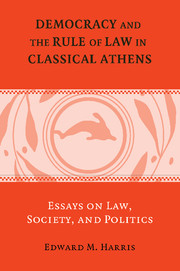Book contents
- Frontmatter
- Contents
- PREFACE
- ACKNOWLEDGMENTS
- ABBREVIATIONS
- INTRODUCTION
- I LAW AND CONSTITUTIONAL HISTORY
- II LAW AND ECONOMY
- 1 Law and Economy in Classical Athens: [Demosthenes] Against Dionysodorus
- 2 When Is a Sale Not a Sale? The Riddle of Athenian Terminology for Real Security Revisited
- 3 Apotimema: Athenian Terminology for Real Security in Leases and Dowry Agreements
- 4 The Liability of Business Partners in Athenian Law: The Dispute between Lycon and Megacleides ([Dem.] 52.20–1)
- 5 Did Solon Abolish Debt-Bondage?
- 6 Notes on a Lead Letter from the Athenian Agora
- III LAW AND THE FAMILY
- IV ASPECTS OF PROCEDURE
- V ENVOI
- BIBLIOGRAPHY
- INDEX LOCORUM
- SUBJECT INDEX
1 - Law and Economy in Classical Athens: [Demosthenes] Against Dionysodorus
Published online by Cambridge University Press: 25 February 2010
- Frontmatter
- Contents
- PREFACE
- ACKNOWLEDGMENTS
- ABBREVIATIONS
- INTRODUCTION
- I LAW AND CONSTITUTIONAL HISTORY
- II LAW AND ECONOMY
- 1 Law and Economy in Classical Athens: [Demosthenes] Against Dionysodorus
- 2 When Is a Sale Not a Sale? The Riddle of Athenian Terminology for Real Security Revisited
- 3 Apotimema: Athenian Terminology for Real Security in Leases and Dowry Agreements
- 4 The Liability of Business Partners in Athenian Law: The Dispute between Lycon and Megacleides ([Dem.] 52.20–1)
- 5 Did Solon Abolish Debt-Bondage?
- 6 Notes on a Lead Letter from the Athenian Agora
- III LAW AND THE FAMILY
- IV ASPECTS OF PROCEDURE
- V ENVOI
- BIBLIOGRAPHY
- INDEX LOCORUM
- SUBJECT INDEX
Summary
sometime around 322 bce, a man named dareius brought a private action in an Athenian court against a merchant called Dionysodorus. Dareius and his business partner Parmeniscus had made a loan to Dionysodorus and his partner Pamphilus for a trading voyage to Egypt and back. In his opening words of his speech to the court, Dareius describes the risks confronting men who made maritime loans.
We who decide to engage in maritime trade and to entrust our property to other men are clearly aware of this fact: the borrower has an advantage over us in every respect. The borrower receives a clearly agreed upon sum of money, but all he leaves behind is just his promise to perform his legal duties in a small tablet bought for two obols and written on a tiny scrap of paper. We on the other hand do not promise to give the money, but immediately turn it over to the borrower. What do we place our trust in and what assurance do we receive when we part with our money? You and your laws which order that all agreements one makes willingly will be binding.
In his closing words, Dareius discusses the close connection between the role of the courts in enforcing contracts and the volume of trade in the marketplace of Athens.
Do not ignore the fact that by resolving one dispute you are passing a law for the entire port of Athens. Many of the men who have chosen to engage in overseas trade are watching you to see how you will decide this case. […]
- Type
- Chapter
- Information
- Democracy and the Rule of Law in Classical AthensEssays on Law, Society, and Politics, pp. 143 - 162Publisher: Cambridge University PressPrint publication year: 2006



